Lessons from Mabi six months after the flood – A report from CWS Japan
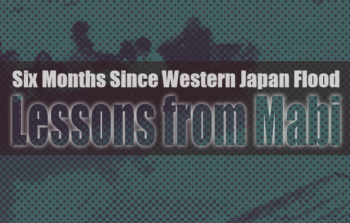
Report (PDF): Lessons-From-Mabi
In June and July 2018, heavy rainfalls hit the western part of Japan. One of the most affected areas was a small town called Mabi in the Okayama prefecture. The embankments of the Takashi and Oda rivers broke down in eight different places and flooded almost one-third of the town. In many areas the water rose as high as five meters. About 4600 houses were affected and 51 people killed, most of whom were elderly.
A report by CWS Japan summarizes the key findings of the research done through literature and field visits between November 2018 and January 2019, carried out by CWS and supported by various Japanese institutions and ACT Alliance members. It highlights the findings as well as the steps taken in the aftermath of the disaster in order to strengthen community resilience, covering issues like flood risk communication, infrastructure, early warning, shelter management and health concerns.
The report contains good practices which have proven of value as well suggestions to strengthen response. Takeshi Komino from CWS Japan: “The lessons from Japan we believe are applicable in many areas. For example the timing of risk communication in midst of urbanization, the effectiveness of emergency evacuation communication from authorities, mobilization and management of various types of volunteers, optimization of human-centered information management, and the need for different sets of plans for the vulnerable part of the population.”
For further questions, please contact public@cwsjapan.jp
Joint letter by ACT Alliance and UNICEF on new partnership agreement
Date: December 8, 2017
Calling your attention to a new partnership agreement between UNICEF and ACT Alliance
United by our common desire and belief that all children have a right to survive, thrive and fulfill their potential, UNICEF and ACT Alliance are delighted to announce the formation of an institutional partnership to work more closely together with faith leaders, actors and faith communities in our joint goal of ensuring that children’s rights are achieved globally. ACT Alliance is the world’s largest Christian protestant and orthodox alliance engaged in humanitarian, sustainable development and advocacy work (www.actalliance.org). UNICEF works to improve the lives of children and their families, fighting for the rights of every child seeking safe shelter, nutrition, protection from disaster and conflicts, and equality (www.unicef.org).
The common purpose of this partnership is to collaborate in agreed joint projects at global, regional and national levels, to mobilise stronger, more effective, evidence-based and rights-based engagement, advocacy and action between both organisations and the communities they seek to assist.
As UNICEF Country Representatives and ACT Alliance National Forums you can help build this collaboration through practical initiatives at country and community levels. We ask that you seek to establish contact between the two organisations in countries, and to explore where and how you can work together on programmes and advocacy that defend children’s rights.
For ACT Alliance, the rights of children need to be upheld in all aspects of our work —humanitarian, development and advocacy. A partnership with UNICEF will make it possible for ACT members to be an even stronger voice at the national, regional and global levels, championing the rights of children in all we do.
UNICEF firmly upholds that the 2030 Agenda for Sustainable Development is about the future of both people and planet. Both are under severe threat. In some cases that is because of actions committed and in others because of what has been omitted. Faith-based organizations and actors are at the centre of humanity’s actions and reactions and together with country leadership, the ACT partnership can bring change on the ground for children and their families.
Yours sincerely, Ms. Karin Hulsof Regional Director, East Asia and Pacific Region UNICEF Email: khulshof@unicef.org | Mr. Anoop Sukumaran, Regional Representative, Asia and the Pacific ACT Alliance Email: Anoop.sukumaran@actalliance.org |
ACT Alliance Statement on Commitments for the Global Compact on Migration at the Global Level
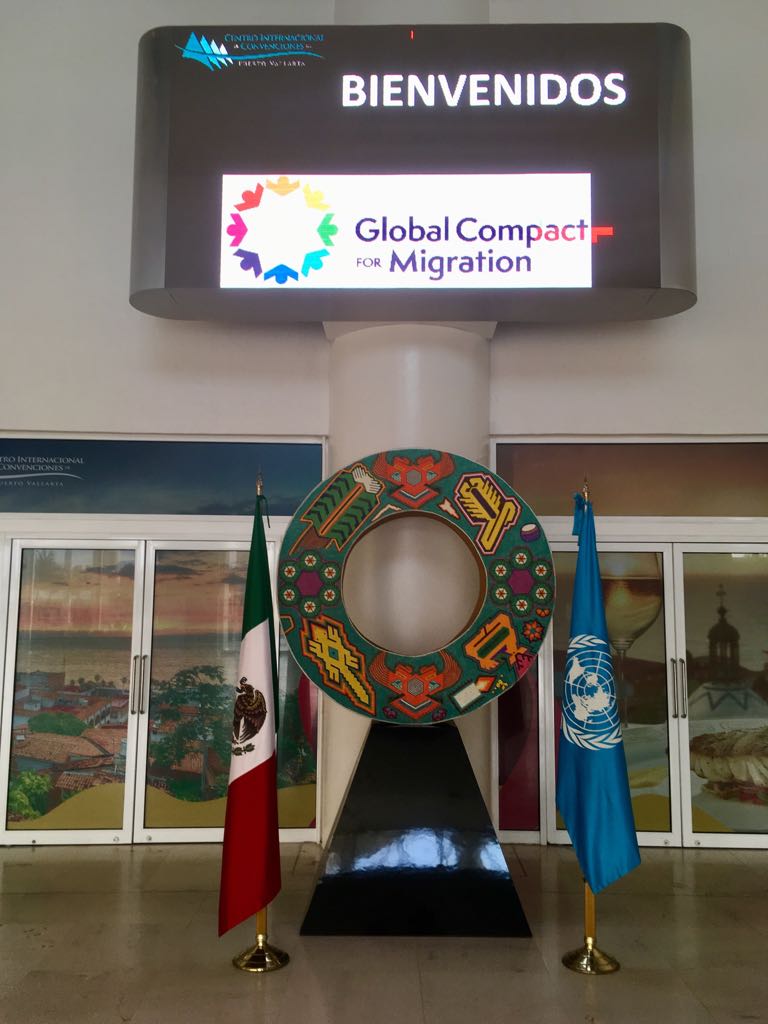
Delivered at the Preparatory (stocktaking) meeting of the Intergovernmental Conference to adopt a Global Compact for Safe, Orderly and Regular Migration
Puerto Vallarta, Jalisco, Mexico, 5 December 2017
Thank you, Mr Chair.
We have heard several very good suggestions and ideas from states and other stakeholders today, and we welcome the open spirit of the discussion.
At the global level, the following commitments for a Global Compact on Safe, Orderly and Regular Migration would be important from our view:
Firstly, we need an increase and enhanced access to regular pathways for migration across all sectors – in keeping with established labour rights standards and relevant ILO conventions, and based on comprehensive, long-term and honest labour market analyses within and between countries.
Secondly, commitments need to be formulated in such a way as to avoid a Compact that focuses primarily on facilitating enhanced returns. We are concerned about the current inconsistency in standards related to assessing voluntariness of return decisions, the transparency and human rights compatibility of readmission agreements, and he lack of effective and independent post-return monitoring in countries of origin; furthermore, reintegration of returning migrants is an area that has not been consistently addressed in global processes so far, and would need a much more robust and participatory engagement with migrants and their communities themselves in order to make it sustainable.
Finally, we would like to draw attention to the need for ensuring complementarity between the Global Compact on Safe, Orderly and Regular Migration and the Global Compact on Refugees, in order to ensure that issues such as those mentioned above, and potentially affecting people on the move which do not easily fall into the categories ostensibly covered by both Compacts, can be addressed in an integrated and human-rights compliant manner. In order to ensure this, reference should be made in the Compact text to commitments affecting these populations, and provisions should be made in the monitoring and implementation mechanism that would ensure regular and effective exchange between states and other stakeholders, including affected migrants and refugees themselves, about progress towards achieving relevant goals.
Thank you.
ACT Alliance expresses concern over US President’s statement on Jerusalem
We are deeply concerned with the decision of the US President this week to recognize Jerusalem as the capital of Israel. We consider this decision to be a grave violation of International Law and the UN Resolutions vis-à-vis the Palestinian Israeli conflict, particularly UN Resolution 181. This decision will have serious ramifications on and cause irreversible harm to the peace process, the Status Quo of Jerusalem and interreligious relations in the region.
We recognize that Jerusalem is a city central to three faiths, and is further home to two peoples. Jerusalem’s status as an international city must be maintained for the stability of the region and Israeli-Palestinian relations.
As a humanitarian network, we are very conscious that this decision will also add to the human suffering of the Palestinians. This will have the potential of escalating tensions, violence and the loss of innocent lives, not only in the Palestinian Occupied Territories, but also throughout the region.
We call upon the international community to continue to recognize the international status of Jerusalem and to push for a peaceful and just settlement based on the UN Resolutions and respect for the human dignity and life of the Palestinians.
Rudelmar Bueno de Faria
General Secretary
ACT Alliance
ACT Alliance EU Position Paper on Food Security and Climate Change
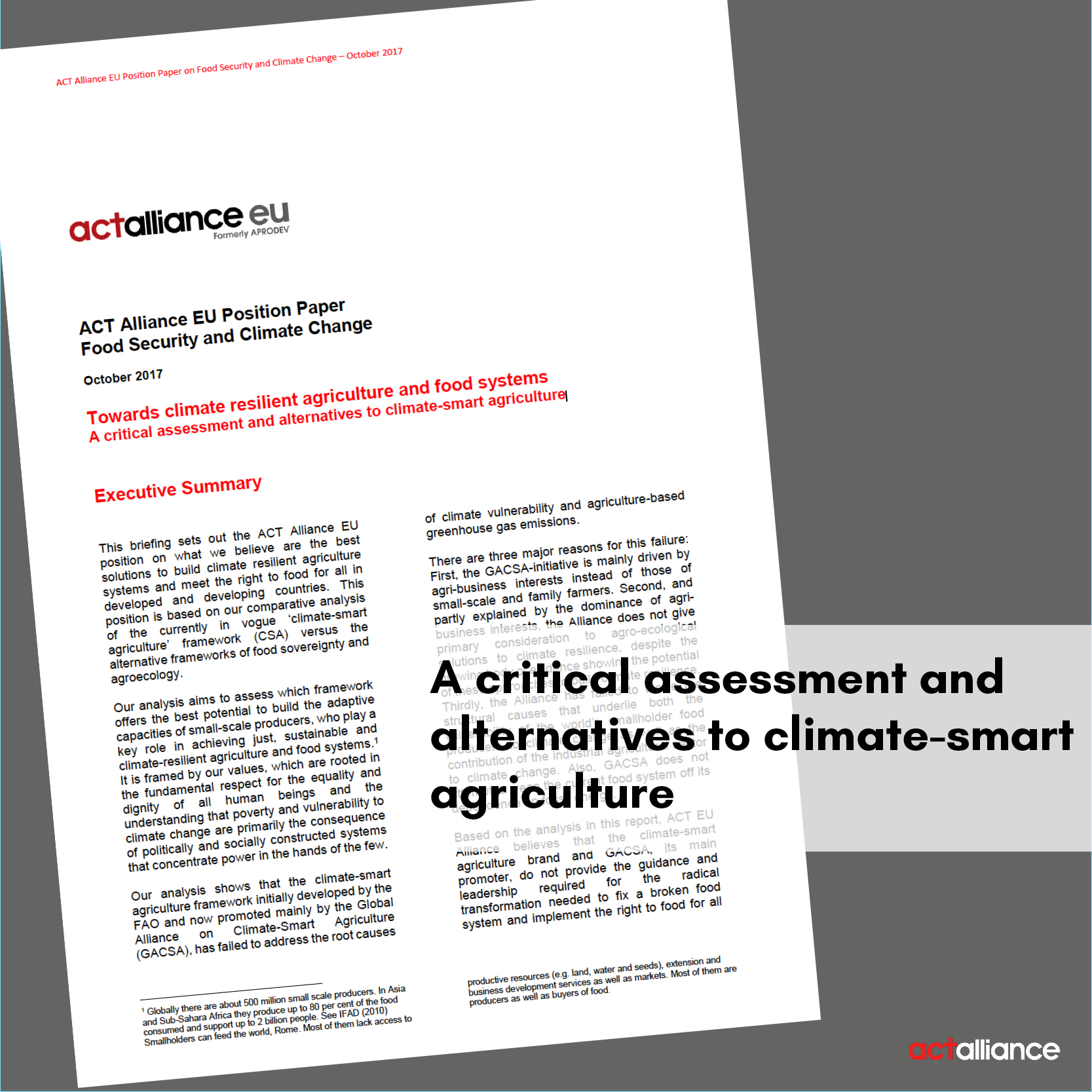
Towards climate resilient agriculture and food systems
A critical assessment and alternatives to climate-smart agriculture
This briefing sets out the ACT Alliance EU position on what we believe are the best solutions to build climate resilient agriculture systems and meet the right to food for all in developed and developing countries. This position is based on our comparative analysis of the currently in vogue ‘climate-smart agriculture’ framework (CSA) versus the alternative frameworks of food sovereignty and agroecology.
Read the publication here
Our call to action on Global Resilience, Sustainability & Solidarity with Climate Vulnerable People
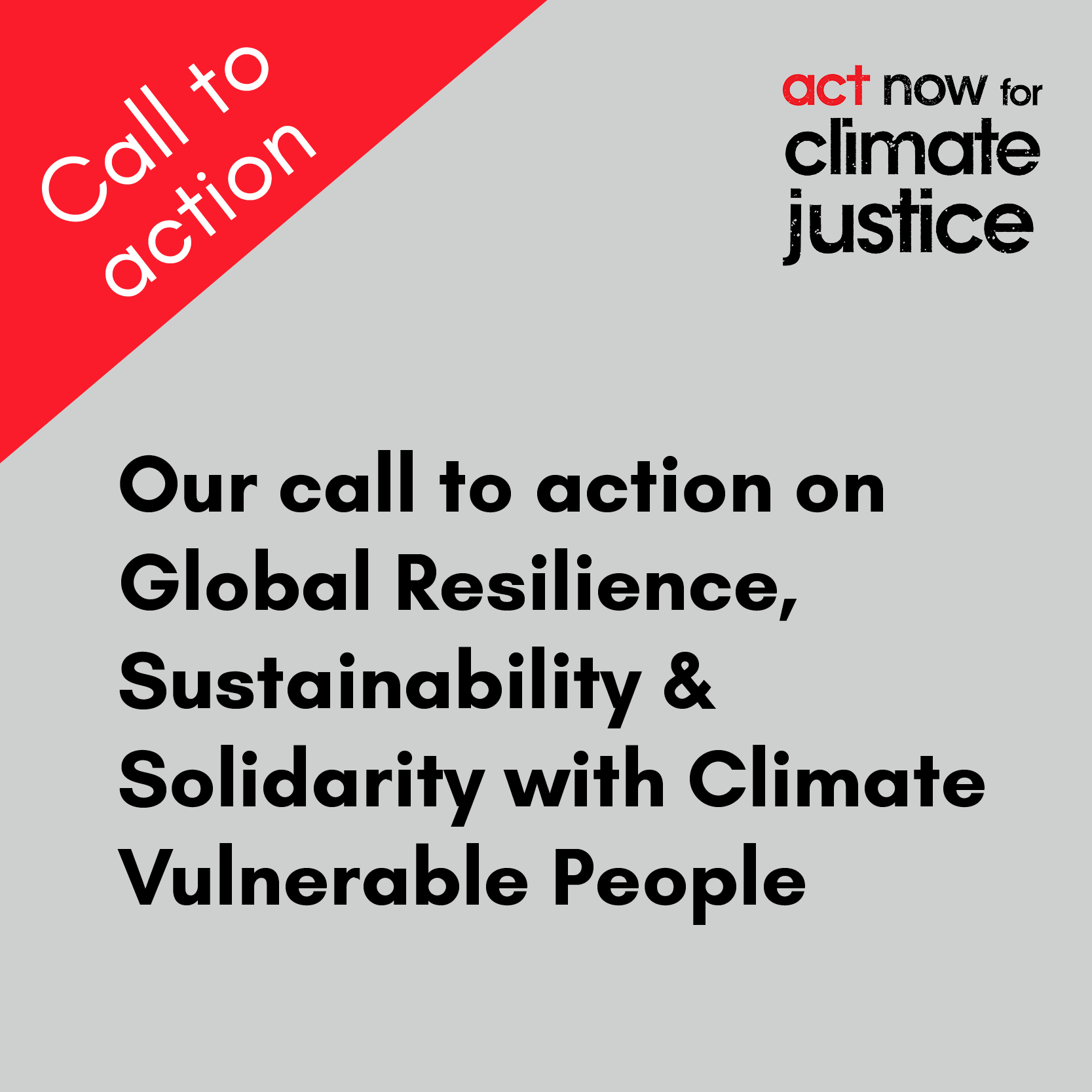
The moral and ethical imperative to address climate change
As faith leaders and faith-based organisations from all across the world, we acknowledge that our wellbeing as human beings depends on and is closely intertwined with the wellbeing of our planet and the whole of creation. As people of faith, we are called to care for creation and share the resources of the earth in a sustainable and equitable way.
We acknowledge that human greed and consumerism are violating planetary boundaries and have led to the environmental crisis we are facing. We call for a change from the current model of development and economics to one that is sustainable, equitable and prioritises intergenerational justice and the rights of the most vulnerable, including indigenous people.
We have once again come together on the occasion of the 23rd Conference of the Parties to the UN Framework Convention on Climate Change (COP23) to call for clear steps forward in the elaboration of the key elements of the Paris Agreement, including the rulebook, climate finance, and setting the foundations for accountable dialogue and cooperation at all levels. The outcome of COP23 should not only set a positive tone for COP24, but also serve as a strong signal and a commitment to combat climate change.
COP23 is the first climate summit hosted by a small, climate vulnerable island state, Fiji. This COP comes after the sad declaration by the U.S.A, the country with the highest cumulated and per capita carbon emissions, of their intention to withdraw from the Paris Agreement. We regret this unfortunate step and affirm our full commitment to multilateral climate action and policies as an important way to protect and preserve the planet and its people, including future generations. We call on all other nations to step up their ambitions and not hide behind the inaction of USA.
The need for ambitious implementation of the Paris Agreement
The successful implementation of the Paris Agreement depends on ambitious elaboration and implementation of the Nationally Determined Contributions (NDCs), National Adaptation Plans (NAPs) and Long-term Strategies (LTS), enabled by increased international cooperation and support.
The goal of keeping global temperature rise below 1.5 degrees Celsius requires much deeper emission reductions than what the aggregate NDCs so far submitted by governments account for. It further requires the political will to eliminate fossil fuels, invest in renewable energies, and build more resilient and transformative communities. In addition, countries must agree to use the Facilitative Dialogue in 2018 as an opportunity for a mandatory revision of each country’s climate change commitments.
Climate finance is the critical tool for meeting the challenge of climate change and for achieving the global transformation to a low-greenhouse gas emission economy and for building a resilient global society that protects all creation. It is important to ensure accountability and transparency around the provision of support, including clearly defining what constitutes climate finance. We call for the inclusion of clear modalities, procedures and guidelines on the financial support provided to developing countries in the transparency framework of the Paris Agreement.
Climate induced loss and damage is a reality that vulnerable communities all over the world are facing. We call for the reaffirmation of loss and damage as a critical pillar for climate action that requires financial support and further call for the recognition of ecosystem, economic and non-economic loss and damage, particularly those related to loss of territories and cultural and spiritual heritage. As people of faith, we are alarmed at the extent to which the poorest and most vulnerable people, for example in the Pacific, are affected and displaced. Climate change is a matter of social and economic justice.
The centrality of human rights, equity and gender justice
Climate change and its impacts affect the full enjoyment of human rights and dignity. Both from the perspective of our belief in God as the Creator, Liberator and Sustainer, and from the perspective of justice and human rights, Climate Change is a matter that must be urgently addressed by human beings in our age. The world has experienced some of the worst extreme weather events in recorded history in recent months, ranging from the record-breaking hurricane Irma to severe droughts in the Horn of Africa, from unprecedented wildfires in Europe and North America to extensive flooding in Asia. These impacts drastically inhibit the efforts of communities to address poverty and to live dignified lives. In all these, the poor and most vulnerable are hit the hardest. As per the Paris Agreement, we call on states to “respect, promote and consider their respective obligations on human rights” when taking action to address climate change.
We affirm the full and meaningful participation of women and men in climate change related decision-making and actions at all levels. In a climate resilient society, women and men should have equal access to power, information and resources. Having an equal opportunity to participate in decision-making processes from the local level to the global UN climate negotiations is essential. The competence and experience of women and men of all groups must be incorporated equally to shape climate and development interventions, to ensure that these meet everyone’s basic needs and strategic interests.
The traditional lifestyles of the indigenous people from the Arctic to the Pacific are threatened and already affected by climate change. Indigenous voices, sharing their cultural and spiritual understandings, must be included in the dialogue on climate change, helping to transform our world to a more sustainable future.
Similarly, youth must be in the midst of our discussion. Young people bring their ideas, energy and passion to the table. They are the future, but they are also part of the world now, and must be included in our work. Intergenerational justice must be a part of the climate agenda.
We affirm the principles of the UN climate change convention and call on the countries with the highest responsibility for greenhouse gas emissions and the greatest wealth to take the lead and to support others, and in particular the most vulnerable and poorest, in climate protection, resilience building and sustainable development. Accordingly, G20 and especially G7 countries have a historic responsibility and opportunity to lead by example in transforming their economies and helping others to do the same.
Our commitment and responsibility
As faith leaders and faith-based organizations, we commit ourselves to address climate change, including partnership with our governments and other stakeholders. We further commit ourselves to encourage and support our grassroots and global networks as well as to mobilise our various faith resources to contribute to a resilient and sustainable life for this generation and generations to come.
We will work with our communities and partners to contribute to the successful implementation of the Paris Agreement in close alignment with the Sustainable Development Goals and the Sendai Framework for Disaster Risk Reduction.
We stand in solidarity with the most vulnerable and seek to ensure that their voices are heard.
Signatories:
![]()

Virtuous Circle: scaling up investment in low carbon energy
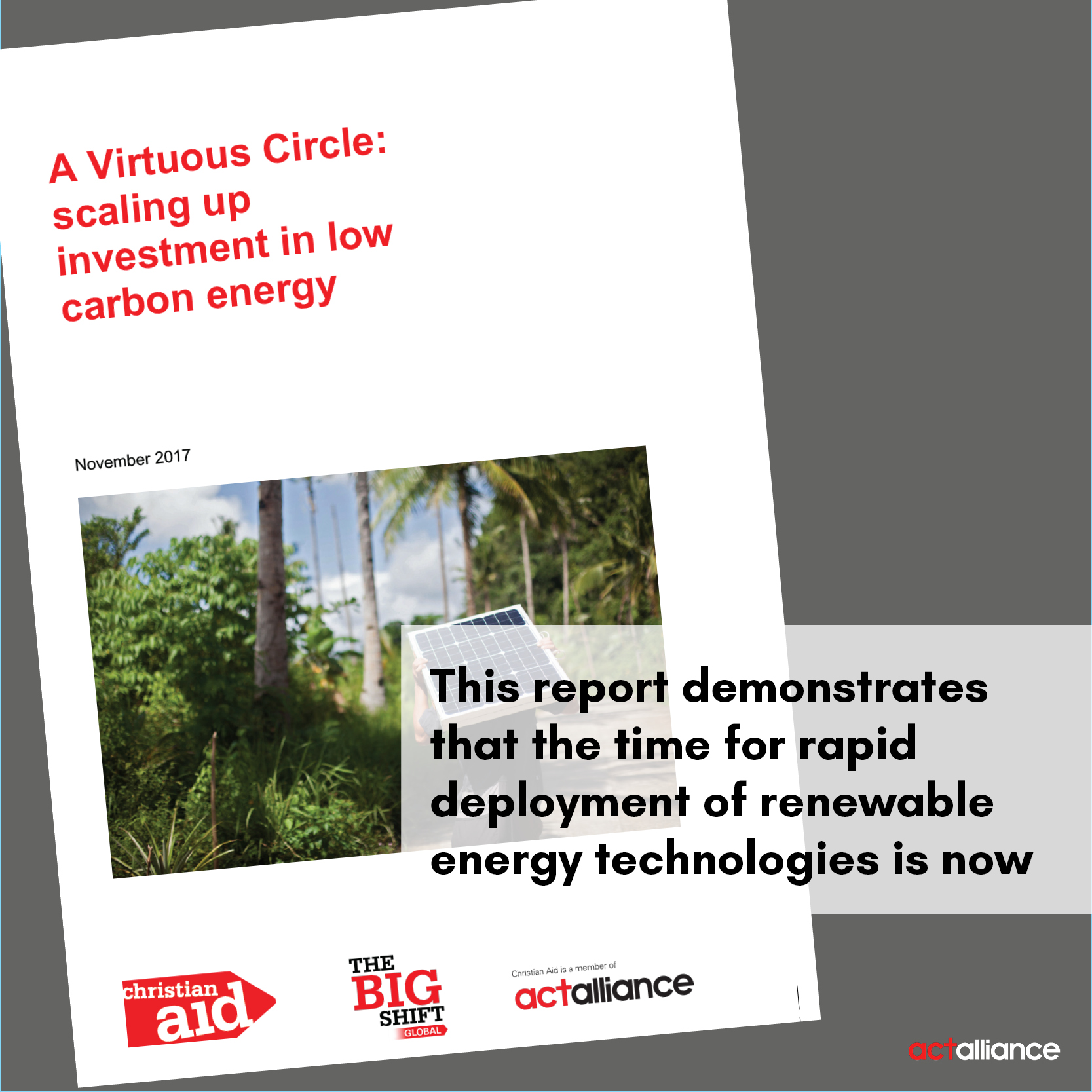
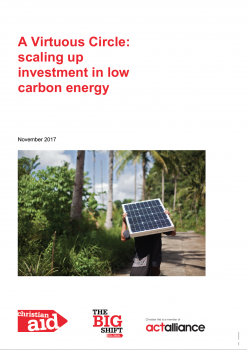 This report demonstrates that the time for rapid deployment of renewable energy technologies is now. It shows that governments, policy makers and investors should realise that clean energy and clean energy investments are reliable, cost effective and scalable, and a solution for delivering clean and sustainable energy for all.
This report demonstrates that the time for rapid deployment of renewable energy technologies is now. It shows that governments, policy makers and investors should realise that clean energy and clean energy investments are reliable, cost effective and scalable, and a solution for delivering clean and sustainable energy for all.
Read the report here
Non-Economic Loss And Damage
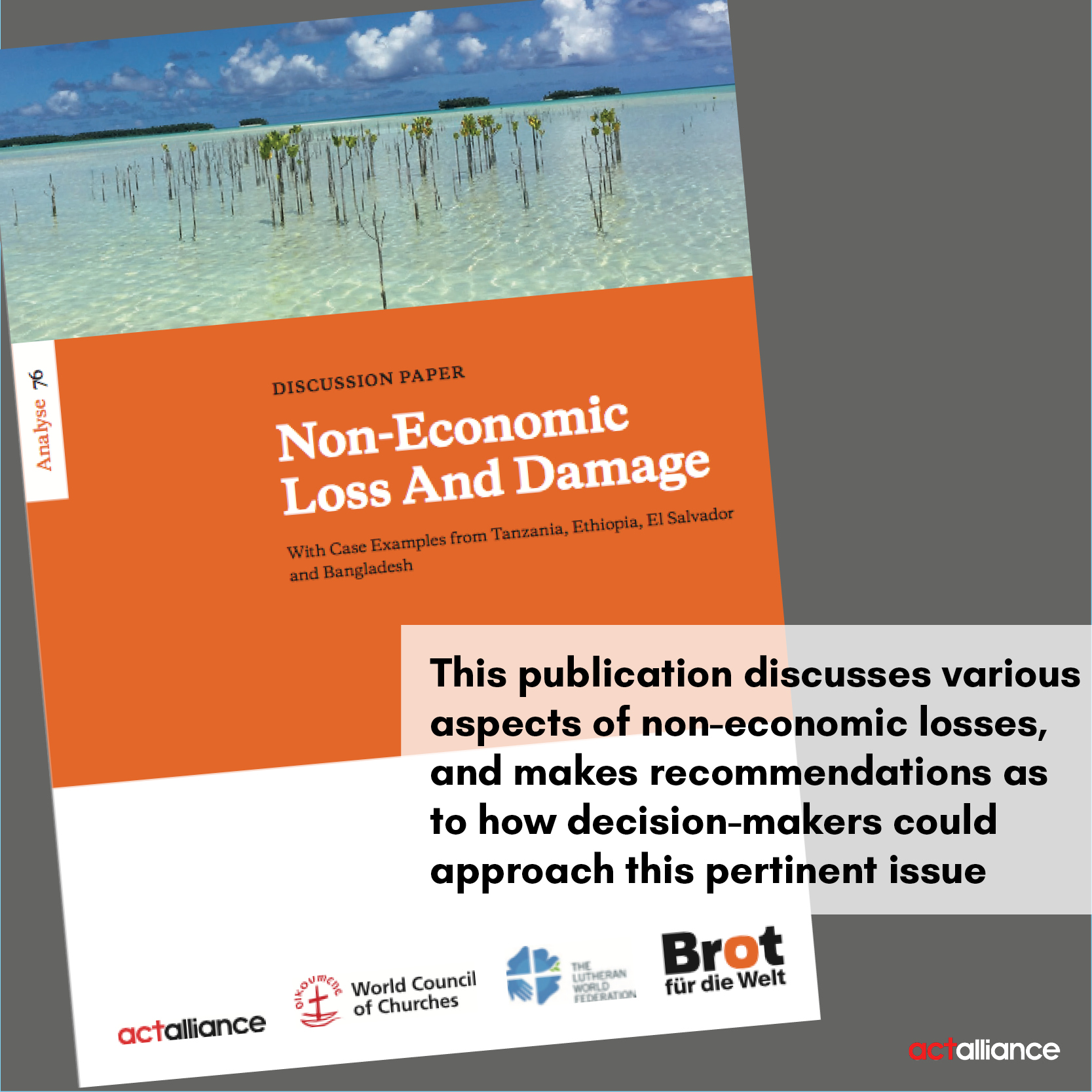
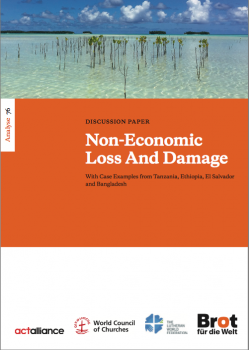 Marginalized, vulnerable, and poor people are affected by climate change in various ways. Financial help may get them back on their feet, but it is not enough to truly remedy their suffering. The loss of lives, land, territory, language, and culture can’t be valued in monetary terms. It is critically important to pay attention to this aspect of climate-induced loss and damage. As faith-based groups, we intend to foster discussions on non-economic loss and damage caused by climate change and to ensure that the voices of the most vulnerable are heard.
Marginalized, vulnerable, and poor people are affected by climate change in various ways. Financial help may get them back on their feet, but it is not enough to truly remedy their suffering. The loss of lives, land, territory, language, and culture can’t be valued in monetary terms. It is critically important to pay attention to this aspect of climate-induced loss and damage. As faith-based groups, we intend to foster discussions on non-economic loss and damage caused by climate change and to ensure that the voices of the most vulnerable are heard.
This publication discusses various aspects of non- economic losses and makes recommendations as to how decision-makers could approach this pertinent issue.
Read HERE
Acting together Building stronger: Lessons from the ACT Alliance response to the Typhoon Haiyan
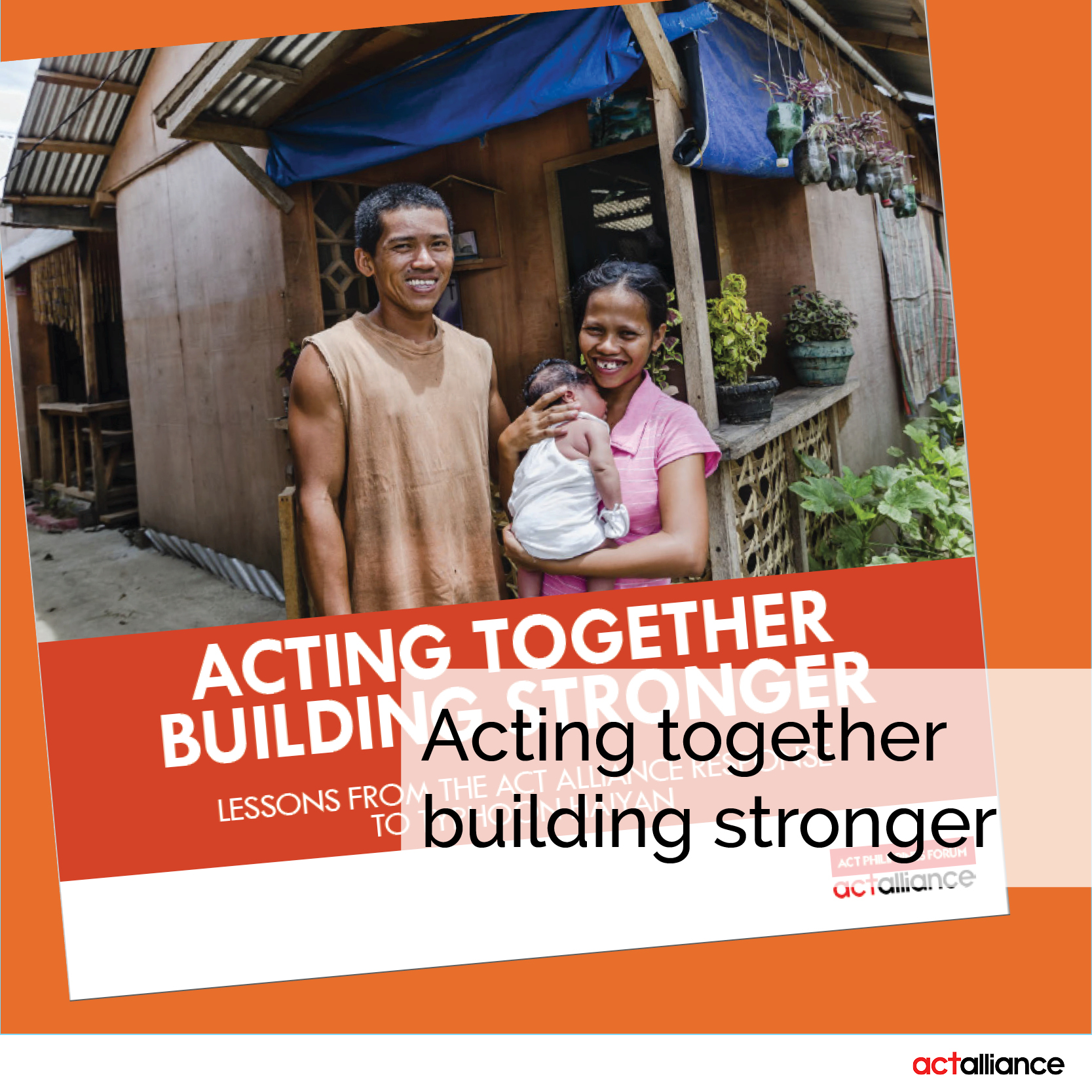
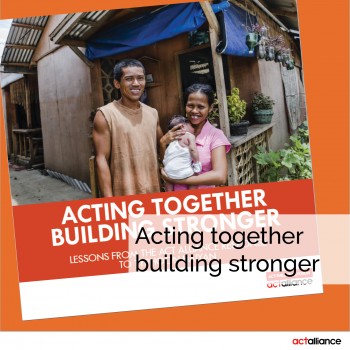 It is expedient to tell the story of the humanitarian response of ACT Philippines Forum to the disaster wrought by Typhoon Haiyan in 2013. ACT Philippines Forum was barely organized when Typhoon Haiyan struck. The humanitarian work was an acid test. But more than that, it showed ACT Philippines Forum where and how it “will lay its treasures” in the coming years. It directed the Forum to appreciate more fully its reason for being.
It is expedient to tell the story of the humanitarian response of ACT Philippines Forum to the disaster wrought by Typhoon Haiyan in 2013. ACT Philippines Forum was barely organized when Typhoon Haiyan struck. The humanitarian work was an acid test. But more than that, it showed ACT Philippines Forum where and how it “will lay its treasures” in the coming years. It directed the Forum to appreciate more fully its reason for being.
This learning document is also a testimony of the survivors, who, while unknown to the millions who prayed and helped, were the face of Christ. Going beyond being mere statistics and recipients, the survivors taught us lessons on faith, endurance and thanksgiving.